The speech was mainly an attack on Stalin, who had died a few years ago. It was also a calculated move by Khrushchev, allowing him to consolidate his position in the Communist Party. Although almost everyone was aware of the atrocities committed by Stalin, the speech was the first formal criticism of the leader. The focus was on the Great Purge, in which over one million Soviet citizens were arrested and sent off to labour-camps or executed.

Khrushchev's Secret Speech
by johnjackson
The "Secret Speech", formally known as "On the Cult of Personality and Its Consequences", was a radical four-hour speech made to the Twentieth Party Conference in 1956.
Preparations for the speech
Evidence gathered
A huge amount of the speech was based upon the findings of the Pospelov Commission, which concluded that of the estimated one and a half million people arrested, almost 700,000 were killed.
Why did he make the speech?
There is some debate over the real motives for the Secret Speech.
- Many suggest that his desire to cement his own position led him was an important factor. The majority of the Communist Party understood that, after roughly thirty years of Stalin's rule - often accompanied by terror and repression, it was time for reform. By making this speech, Khrushchev probably hoped to strengthen his position in the struggle for power following Stalin's death by distancing himself from the hated policies of the previous era.
- Honest ambition to make a break with the past was a factor. The fear created under Stalin's leadership meant that managers of Soviet industry or agriculture were too afraid to take any risk, which could have solved many of the problems in the economy. This stifling of initiative meant that, over the years, the Soviet economy became even more out-dated and labour intensive.
Context
- Speech was called into session after the end of the Twentieth Party Congress
- Foreigners were excluded as the speech was meant to be private
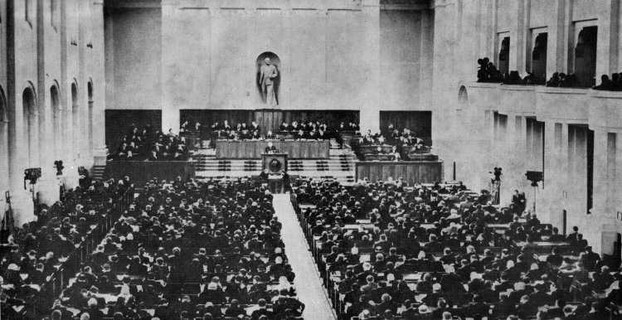 The Twentieth Party Congress |
The speech
Despite the speech being directed towards blaming Stalin for the excesses of his period, including the terror and his mismangement, Khrushchev was careful to ensure that neither the Communist Party itself nor the fundamentals of the Communist system were implicated in the failures, as this would be damaging to not only the Communist ideology as whole - to which he was dedicated - but also his own position. As the title of the report suggests, a main criticism was Stalin's cult of personality, which had transformed him into the tyrant that he had become.
Cult of personality
Marxism-Leninism, upon which the Soviet Union's ideology was based up, did not endorse attributing so much power to a single person. This was in contradiction of the main Communist principle, during the period of the rule of the proletariat, that power should be collective rather than saturated under one man. In addition, Lenin's 1924 Testament was mentioned. This document had been written between 1922 and 1923, which stated that Stalin should have been removed from the role of General Secretary, but had not been distributed due to his ill health and resistance from the Party. This mention of the testament helped Khrushchev to further damage Stalin's legitimacy. The National Anthem and city names were also used as examples of an excessive cult of personality, as they contained many references to Stalin. Khrushchev also stated that the importance of Stalin to the victory of the Soviets in the Second World War was overplayed.
Repression
Khrushchev stated that "Stalin practiced brutal violence...towards everything which opposed him." He mentioned how:
- Stalin had labelled over half of the Seventeenth Party Congress as "counter-revolutionaries", the majority of which were then killed
- Documents had been falsified to incriminate many of his perceived enemies
- Entire ethnic groups, such as Crimean Tartars, had been deported
- The purge of the Leningrad Party and the Doctors' Plot had been the manifestation of paranoia
Limitations
- As previously mentioned, he made sure that the speech did not implicate him or the majority of the Party in the criticism
- Attrocities surrounding areas such as the collectivisation of agriculture were ignored as it was viewed as integral to the success of the Soviet economy
- Could not attack the Communist ideology and therefore did not place some of Stalin's faults into context
- Offered little information on how future leadership would hope to avoid such problems
Results of the speech
The speech was officially secret. However, parts of the speech were allowed to be circulated to schools and other institutions. Nevertheless, within a week or so, the contents of the speech were exposed around the world. Many believe that Khrushchev had intended the speech to be leaked shortly afterwards.
Many areas of the speech were received with applause from the audience. However, some were angry that Khrushchev had denounced Stalin and his policies, which discredited an entire generation. Others thought that it did not go far enough and that the rehabilitation of victims of Stalin needed to be accelerated.
The speech also allowed Khrushchev to become more of a central figure in the Party and consequently, he appointed many of his supporters to the Politburo.
You might also like
Who Was Otto Kubel?Otto Kubel is today best-known by his series of picture postcards based on cl...
10 Messages of Red Riding HoodRed Riding Hood offers several different messages for each of the several hun...
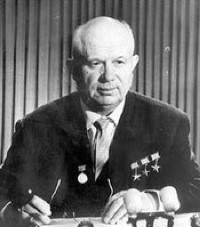

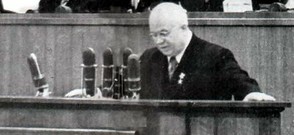





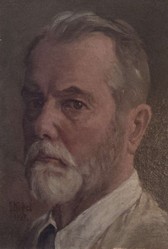
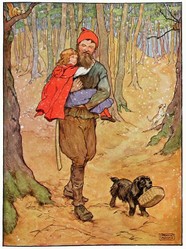
Comments
Wow - didn't know that Stalin had been criticised as early as that within the Soviet Union.